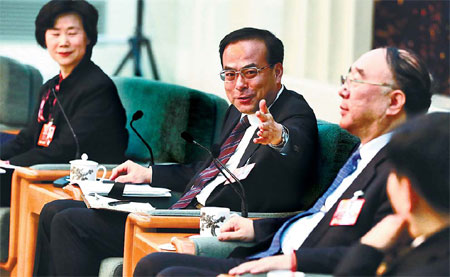Chongqing remains 'pragmatic'
Updated: 2013-03-07 08:07
By Wu Jiao (China Daily)
|
||||||||
|
Sun Zhengcai (second from left), Party chief of Chongqing, during a panel discussion of the Chongqing delegation on Wednesday. Feng Yongbin / China Daily |
Southwest China's Chongqing municipality said Wednesday it is being "resolute" in handling a recent sex scandal involving a number of mid-ranking officials.
Meeting international reporters for the first time since he was appointed Party chief of the sprawling city, Sun Zhengcai also stressed that Chongqing is now staying "low-profile and pragmatic", maintaining its political and social stability as well as economic growth.
Sun made the remarks during a panel discussion on the sidelines of the annual national legislative session.
The 61-member delegation of Chongqing-based national legislators led by Sun attracted around 170 members of the media from both home and abroad during the discussion, as the city has swirled in a slew of scandals involving decadence of its former leader and high-ranking officials.
The city's former Party chief, Bo Xilai, was sacked last March for serious discipline violations. Investigations also revealed that he bore responsibility in a homicide case involving his wife.
Vice-Premier Zhang Dejiang, who is now one of the country's seven-member top leadership, ran the city in the interim.
Sun took over the post from Zhang last November and became the youngest of the 25 newly elected members of the Political Bureau of the 18th CPC Central Committee. Yet the young political star still has to deal with the aftermath of those scandals.
The latest case involves about 10 officials in Chongqing who have been removed from their posts after a whistle-blower revealed a sex tape.
Chongqing authorities said that a criminal group had tried to bait dozens of officials since 2008 by tempting them with sexual favors.
Asked by reporters about the case, Sun, gigantic in stature but soft in tone with a strong hometown accent, said Chongqing takes a clear-cut attitude and is taking resolute measures.
"We have conducted an in-depth investigation and will handle (the case) in line with the law," Sun said.
Media reports said the officials are still under investigation for other possible violations.
Unlike some Chinese ministerial officials who shun reporters, the open-minded Sun also gave more chances for reporters at the scene.
He took questions on Bo, saying that the case is under judiciary procedures.
Less than four months since he was appointed head of Chongqing, Sun said he visited 25 districts and counties under the jurisdiction of the municipality, having talks with local leaders, and has found that Chongqing "has bright prospects" but still remains an underdeveloped region.
In the year since the Bo Xilai scandal shocked the city, Chongqing's economy has grown 13.6 percent, making it one of the fastest growing regions on the mainland. It also maintains quickly growing foreign trade despite the nation's overall foreign trade difficulties.
Yet the fact that its foreign direct investment in 2012 saw no growth - compared with 57 percent annual growth since 2007 - also reflects the impact of the Bo Xilai scandal.
The per capita income of its residents is still lower than the national average, and Sun said people in Chongqing want to improve their standard of living.
Chongqing Mayor Huang Qifan, who also attended the Wednesday panel discussion, said Chongqing still boasts the advantages of having enough labor resources and advantages brought by reforming policies to drive its economy.
Huang said earlier that the Bo and Wang Lijun cases stalled investment, and caused foreign and domestic investors to hesitate about putting their money into the city earlier in the year.
Huang also said at the panel discussion that Chongqing aims to lift the frequency of trains on the more than 11,000-km Chongqing-Xinjiang-Europe International Railway, a logistics route between Asia and Europe honored as "the modern silk road".
Operating since 2011, the railway starts in Chongqing, travels through Russia, Belarus and Poland before arriving in Duisburg, Germany.
The whole journey takes an average of 16 days, and all customs and tariff procedures have been simplified to make international trade more convenient.
While the train operated only once a month in 2011, it will now run every day, said Huang.
The number of departures is expected to reach three times a day by 2015, said Huang, adding that he also hopes the train can bring more commodities on its way back from Europe.
wujiao@chinadaily.com.cn
(China Daily 03/07/2013 page5)

 In Photos: 7.0-magnitude quake hits Sichuan
In Photos: 7.0-magnitude quake hits Sichuan
 Li Na on Time cover, makes influential 100 list
Li Na on Time cover, makes influential 100 list
 FBI releases photos of 2 Boston bombings suspects
FBI releases photos of 2 Boston bombings suspects
 World's wackiest hairstyles
World's wackiest hairstyles
 Sandstorms strike Northwest China
Sandstorms strike Northwest China
 Never-seen photos of Madonna on display
Never-seen photos of Madonna on display
 H7N9 outbreak linked to waterfowl migration
H7N9 outbreak linked to waterfowl migration
 Dozens feared dead in Texas plant blast
Dozens feared dead in Texas plant blast
Most Viewed
Editor's Picks

|

|

|

|

|

|
Today's Top News
Live report: 7.0-magnitude quake hits Sichuan, heavy casualties feared
Boston suspect cornered on boat
Cross-talk artist helps to spread the word
'Green' awareness levels drop in Beijing
Palace Museum spruces up
First couple on Time's list of most influential
H7N9 flu transmission studied
Trading channels 'need to broaden'
US Weekly

|

|








